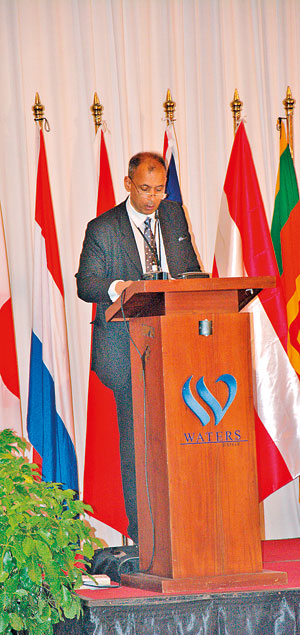News
Dream big, major science forum urges Govt.

Shehan Rathnavale of COSTI presenting the Colombo Resolution at STS Forum Sri Lanka 2016
Sri Lanka, near the bottom of the world ladder in inventions, is paying a heavy price for overlooking science in decision-making, a leading scientist warned at a symposium of almost 700 scientists, inventors, science managers and students.
“We are trying to make incremental steps in embracing science and technology but that is not good enough. We need to dream big,” said Professor Ajith de Alwis, Project Director of the Coordinating Secretariat for Science, Technology and Innovation (COSTI) in the Ministry of Science, Technology and Research.
“To make a real difference in the economy, we need to embrace science. For example, by applying technologies, we can bring the cost of food down and enable more disposable income to people,” Prof. de Alwis said.
The high-level forum, Science and Technology for Society Sri Lanka 2016 (STS), ended last weekend with adoption of the eight-point “Colombo Resolution” that stated economic development should go hand-in-hand with social and environmental progress.
The resolution also calls for the country to foster innovation, build resilient infrastructure and follow sustainable industrialisation and foster innovation. Participants repeatedly pointed out that 14 of the United Nations’ Sustainable Development Goals stressed the importance of technology.
The message carried by the forum – the largest gathering of scientists in the country, with participants from 24 countries – would not have been lost on the ministers who were directly involved in it: Deputy Ministers Dr. Harsha de Silva and Eran Wickramaratne delivered keynote speeches while the Minister for Science, Technology and Research, Susil Premajayantha, was active on all three days, personally marshalling his men to make the event a success.
Fellowship dinners for the participants were organised by invitation at President House and Temple Trees, giving time for both President Maithripala Sirisena and Prime Minister Ranil Wickremesinghe to interact with participating scientists.
“The STS Forum would have injected a good dose of science even to the leaders of the country, so let’s hope that the event helps to foster some change,” Prof. Ajith de Alwis commented.
According to the Global Innovation Index 2016 (GII), Sri Lanka ranks 91st out of 128 countries assessed over their capacity for and success in innovation. Among South Asian countries, India is in 66th position, Pakistan 119, Bangladesh 117, Nepal 115, and Bhutan 96.
The index also ranks Sri Lanka at 102 on annual spending on research and development. The STS Forum noted the very low investment in Sri Lanka on R&D – under 1 per cent of the budget.
Speakers emphasised the importance of getting the private sector involved in research funding but experts cautioned that Sri Lanka’s private sector is extremely conservative and that it has been a challenge to encourage its involvement in R&D.
The forum also had a stream for “Citizen Sciences” that included discussion on science communication. Senior science writer Nalaka Gunawardane commented that social media was both a boon and bane for scientific information, saying, “Peddlers of pseudo-science, anti-science and superstition are faster in adopting social media platforms than actual scientists, science educators and science communicators”.
Astrophysicist Dr. Kavan Ratnatunga, taking a radical stance, objected to a two-minute video on religious observances shown at the forum’s opening ceremony.
“When will the science community of Sri Lanka realise that developing a scientific literate society can’t be done while pandering to religious and astrological beliefs?” he demanded.
“It is unfortunate that the otherwise very well-organised STS Forum started with a two-minute video for religious observances. I hope COSTI will go beyond the talk and take science to our society via a science centre … and regular science programming on national television, which does not have any science programmes at present,” Dr. Ratnatunga said.
The Colombo Resolution and videos covering STS Forum sessions may be viewed soon athttp://www.costi.gov.lk/
Malaka Rodrigo was a panellist in the Communicating Science session

